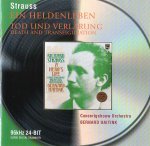

These performances date from the pioneer years of digital recording, a technology that EMI quickly exploited (though not as fast as some of its rivals)

Bernard Haitink’s 1970 Ein Heldenleben with the Concertgebouw is tremendously well played, and it’s good to hear a performance from a conductor who doesn’t present

Neeme Järvi’s sensibly paced but not all that wonderfully played Metamorphosen won’t win any awards, but his Aus Italien delivers the goods in spades, the

Erich Korngold’s String Sextet, played here in an arrangement for string orchestra, was first performed in Vienna in 1917. As with other works of Korngold’s

It’s interesting to hear the stylistic consistency that marks both the teenaged Richard Strauss’ assured, exuberant First Horn Concerto and the aged composer’s Duett-Concertino and

Given his recordings to date, Christian Thielemann seems to be positioning himself as a German repertoire specialist. This may be a mistake, since he seems

This is a budget-priced repackaging of Deutsche Grammophon’s deleted 1988 Böhm/Strauss collection, with slightly better sound this time around. The program notes go into deep

If you think the best part of Richard Strauss’ Die Frau ohne Schatten is its euphoric and seemingly interminable concluding scene (and really wished it

George Prêtre’s association with the music of Richard Strauss is stronger than most classical CD collectors might realize. Prêtre, in fact, led the Paris premiere

Guntram was Richard Strauss’ first opera, composed for the most part in Egypt in the winter of 1892/93 (he had been working on the libretto
![]()
